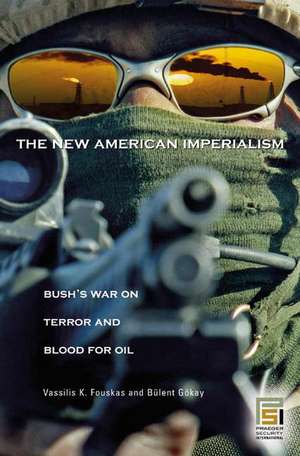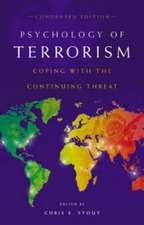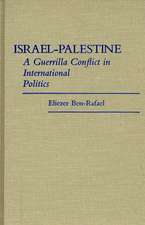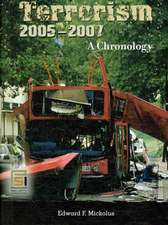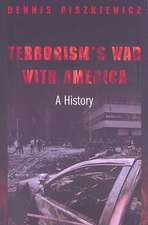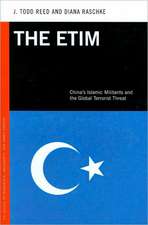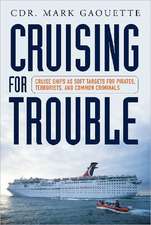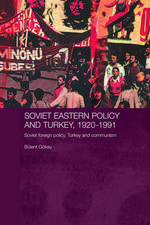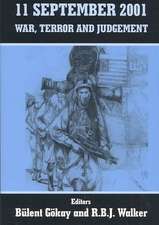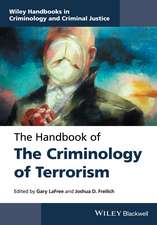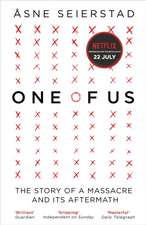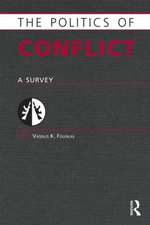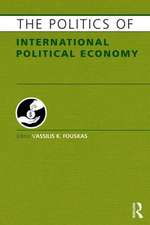The New American Imperialism: Bush's War on Terror and Blood for Oil: Praeger Security International
Autor Vassilis Fouskas, Búlent Gókayen Limba Engleză Hardback – 29 oct 2005 – vârsta până la 17 ani
Din seria Praeger Security International
- 18%
 Preț: 334.19 lei
Preț: 334.19 lei - 8%
 Preț: 335.53 lei
Preț: 335.53 lei - 34%
 Preț: 376.10 lei
Preț: 376.10 lei - 46%
 Preț: 443.64 lei
Preț: 443.64 lei - 29%
 Preț: 240.11 lei
Preț: 240.11 lei - 8%
 Preț: 304.56 lei
Preț: 304.56 lei - 34%
 Preț: 373.82 lei
Preț: 373.82 lei - 19%
 Preț: 412.79 lei
Preț: 412.79 lei - 19%
 Preț: 338.42 lei
Preț: 338.42 lei - 18%
 Preț: 335.62 lei
Preț: 335.62 lei - 27%
 Preț: 377.35 lei
Preț: 377.35 lei - 27%
 Preț: 376.75 lei
Preț: 376.75 lei - 18%
 Preț: 336.46 lei
Preț: 336.46 lei - 18%
 Preț: 321.73 lei
Preț: 321.73 lei - 27%
 Preț: 384.51 lei
Preț: 384.51 lei - 18%
 Preț: 320.50 lei
Preț: 320.50 lei - 18%
 Preț: 320.50 lei
Preț: 320.50 lei - 18%
 Preț: 321.35 lei
Preț: 321.35 lei - 24%
 Preț: 420.54 lei
Preț: 420.54 lei - 14%
 Preț: 335.99 lei
Preț: 335.99 lei - 18%
 Preț: 355.82 lei
Preț: 355.82 lei - 18%
 Preț: 319.83 lei
Preț: 319.83 lei - 18%
 Preț: 334.28 lei
Preț: 334.28 lei - 32%
 Preț: 354.48 lei
Preț: 354.48 lei - 14%
 Preț: 335.14 lei
Preț: 335.14 lei - 38%
 Preț: 405.98 lei
Preț: 405.98 lei - 40%
 Preț: 571.34 lei
Preț: 571.34 lei - 18%
 Preț: 321.85 lei
Preț: 321.85 lei - 18%
 Preț: 323.25 lei
Preț: 323.25 lei - 18%
 Preț: 253.28 lei
Preț: 253.28 lei - 40%
 Preț: 571.50 lei
Preț: 571.50 lei - 14%
 Preț: 333.72 lei
Preț: 333.72 lei - 18%
 Preț: 301.73 lei
Preț: 301.73 lei - 19%
 Preț: 352.96 lei
Preț: 352.96 lei - 26%
 Preț: 387.80 lei
Preț: 387.80 lei - 18%
 Preț: 302.77 lei
Preț: 302.77 lei - 14%
 Preț: 333.91 lei
Preț: 333.91 lei - 17%
 Preț: 325.80 lei
Preț: 325.80 lei - 24%
 Preț: 338.58 lei
Preț: 338.58 lei - 34%
 Preț: 414.73 lei
Preț: 414.73 lei - 18%
 Preț: 354.30 lei
Preț: 354.30 lei - 29%
 Preț: 254.29 lei
Preț: 254.29 lei - 18%
 Preț: 354.11 lei
Preț: 354.11 lei - 18%
 Preț: 334.38 lei
Preț: 334.38 lei - 14%
 Preț: 302.68 lei
Preț: 302.68 lei - 18%
 Preț: 322.97 lei
Preț: 322.97 lei - 27%
 Preț: 376.50 lei
Preț: 376.50 lei - 27%
 Preț: 322.81 lei
Preț: 322.81 lei - 27%
 Preț: 382.91 lei
Preț: 382.91 lei - 18%
 Preț: 320.87 lei
Preț: 320.87 lei
Preț: 351.88 lei
Preț vechi: 427.54 lei
-18% Nou
Puncte Express: 528
Preț estimativ în valută:
67.33€ • 70.49$ • 55.71£
67.33€ • 70.49$ • 55.71£
Carte tipărită la comandă
Livrare economică 07-21 aprilie
Preluare comenzi: 021 569.72.76
Specificații
ISBN-13: 9780275984762
ISBN-10: 0275984761
Pagini: 272
Dimensiuni: 156 x 235 x 25 mm
Greutate: 0.65 kg
Editura: Bloomsbury Publishing
Colecția Praeger
Seria Praeger Security International
Locul publicării:New York, United States
ISBN-10: 0275984761
Pagini: 272
Dimensiuni: 156 x 235 x 25 mm
Greutate: 0.65 kg
Editura: Bloomsbury Publishing
Colecția Praeger
Seria Praeger Security International
Locul publicării:New York, United States
Notă biografică
Vassilis K. Fouskas is a Senior Lecturer in International Relations at the University of Stirling. He is the founding editor of the Journal of Southern Europe and the Balkans and the author of Zones of Conflict: U.S. Foreign Policy in the Balkans and Greater Middle East (2003) and Italy, Europe, and the Left (1998).Búlent Gókay is a Senior Lecturer in International Relations at Keele University. He is the editor of the Eurasian Studies Network and the author of The Politics of Caspian Oil (2001) and co-editor of Kosovo: Politics of Delusion (2001) and 11 September 2001: War, Terror, and Judgement (2003).
Cuprins
Foreword by Peter GowanAcknowledgmentsIntroductionPart I Neo-Imperial Strategies: Illusions of Power1 Money, Oil, and Power2 Controlling Governments3 The New American Way of War4 Neo-Imperialist IdeologyPart II A Dream Come True: "Now We Can Claim the World"5 The Battle for Caspian Oil6 The U.S./NATO War on Yugoslavia7 The Greater Middle East Initiative8 Iraq's Shiites Move to Fill a Power Vacuum9 Ukraine: Regime Change, U.S. Style10 Beasts in Samaritan ClothingConclusion: An Overview of the New American ImperialismBibliographic EssayIndex
Recenzii
Recommended. Upper-division undergraduates, graduate students, and faculty.
